
In 2024, How to Transfer Photos from Infinix Note 30 VIP to Laptop Without USB | Dr.fone

How to Transfer Photos from Infinix Note 30 VIP to Laptop Without USB
Moving your photos on a computer comes with lots of benefits. Among them is the larger screen itself, which allows you to inspect the image details in a more thorough manner. Another thing is that the computer also serves as a great backup storage for your dearly cherished photos. You can be sure that the image folders you create in the computer’s local memory are highly secure. Just organize each file with labels to avoid unnecessary confusion. Simply put, our computers have a lot to offer with regard to file organization and data management.
Many people assume that copying your files to a computer is a bit of a hassle. Well, it’s somewhat true unless you’re going to opt for wireless data transfer. Yes. That’s possible. There are many tutorials out there on how to copy files from your phone to your laptop without USB. Simply choose a particular method that works best in your situation.
In this article, we will provide a short guide on how to organize your computer files easily and quickly. We will also list down a few tutorials on how to transfer photos from your phone to your laptop without USB. Continue reading below to learn more.
How to Organize the Photos on Your Computer
While smartphones offer convenience for snapping photos on the go, viewing your pictures is doubtlessly much better on a computer. Why not? Computers apparently have larger screens that increase image quality to another level. However, finding a specific photo in your desktop storage can be a daunting experience if your files are unorganized. Don’t worry. Listed below are some useful organization techniques that can help you a lot in this regard.
Add the Image Folders to the Photos Application
Many operating systems have a built-in Photos application to help you organize and view your pictures more efficiently. You may use it to organize your photos in separate folders and create a centralized hub for browsing.
Add Tags to Your Photos
Tagging your photos is a versatile way to categorize and organize them based on themes, events, or people. Most photo management applications allow you to add descriptive tags that make it easy to search the media files later. This is particularly useful for quickly locating pictures of specific occasions or individuals.
Keep Your Photos in Separate Folders
Make it a habit to create separate folders for different events, locations, or time periods. This organization method helps you maintain a clear structure for your photo collection. For example, you might have folders for vacations, family gatherings, or special occasions. Organizing photos this way simplifies navigation and ensures that each set of pictures is kept properly.
Rename Your Photo
Give your photos descriptive and unique filenames that reflect either their content or context. Organizing your files by their respective labels helps you find them easily instead of relying solely on visual cues. Consider including dates, locations, or key details in the filenames to make your photos easily identifiable.
NOTE: By incorporating these organization techniques, you can surely enjoy your memory collection on the larger canvas of your computer screen. Take advantage of these methods to transform your digital photo library into a well-ordered and easily accessible archive. Moreover, these are prerequisites for the tutorials on how to transfer photos from your phone to your laptop without USB.
How to Transfer Photos From Phone to Laptop Without USB in Easy Steps
Copying photos from smartphones to laptops has become significantly more straightforward today than in the past. In fact, the entire data migration process can be completed within a few minutes. No need to resort to advanced interventions and external assistance. Just choose a particular tutorial below on how to transfer photos from your phone to your laptop without USB. Initiate each step carefully and complete the procedure in no time. Check out the list below to get started.
Method 1: Transfer photos from phone to laptop using iCloud web
If you’re an Apple user, you can easily transfer photos from your phone to your computer via iCloud. Don’t worry. It’s a very simple data transfer procedure you can definitely complete with little to no effort. Here’s a short guide on how to transfer photos from your phone to your laptop without USB using iCloud.
- Step 1: First and foremost, make sure that your iPhone is syncing your photos to iCloud. To check it, go to Settings > Apple ID > iCloud > Photos. Toggle on the radio button next to Sync This iPhone.
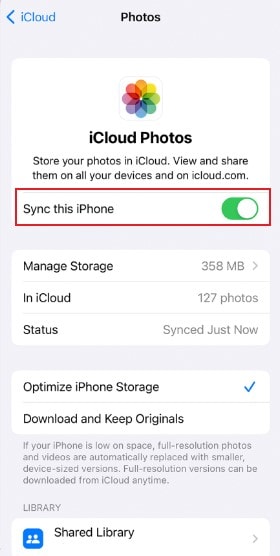
- Step 2: On your computer, launch the Browser.
- Step 3: Visit icloud.com. Once it fully loads up, click Sign In. Log in to the Apple ID account you’re currently using on your iPhone.
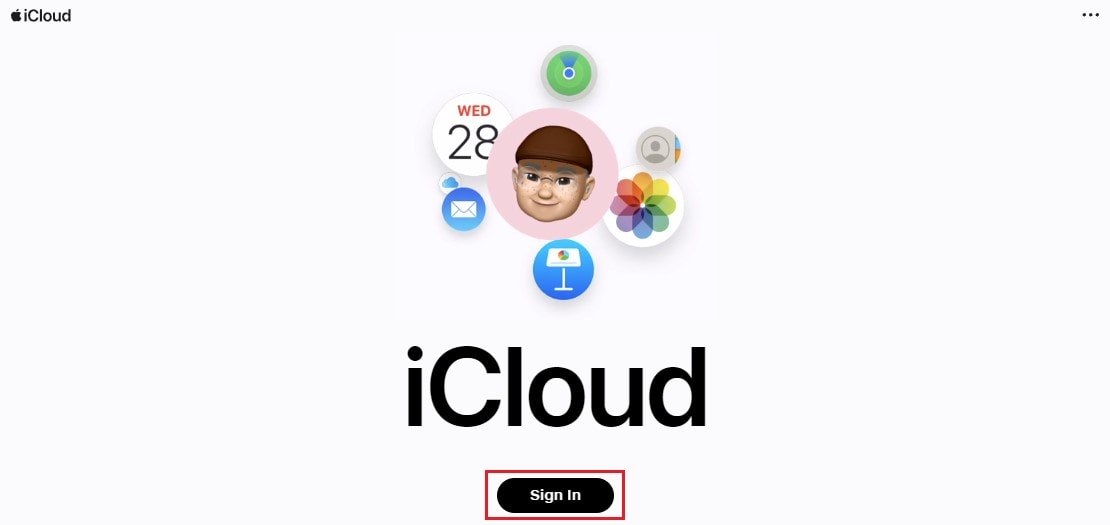
- Step 4: Click on the Photos icon.
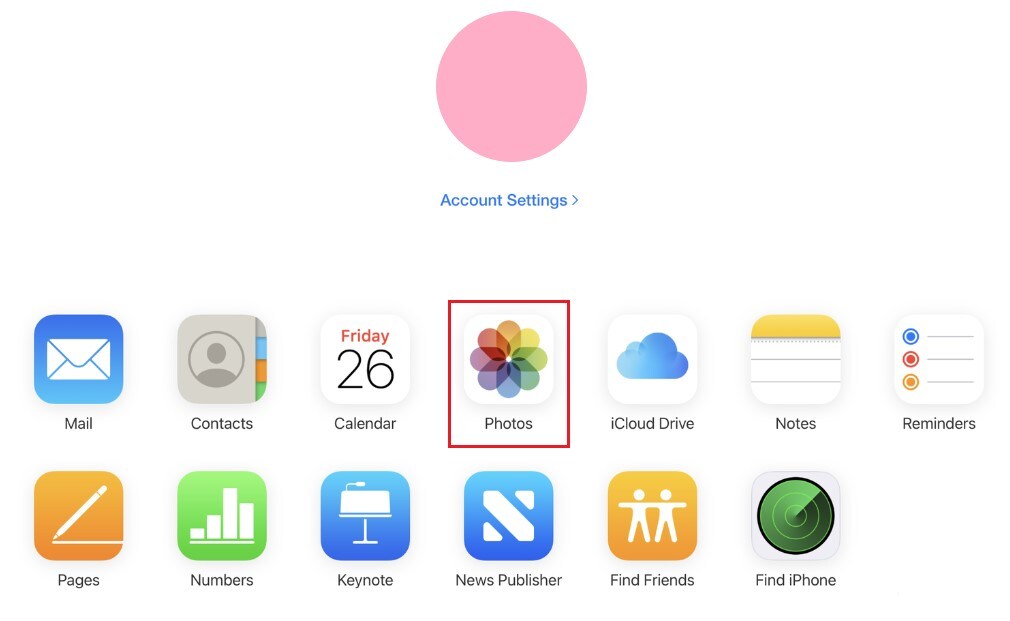
- Step 5: Select the photos you want to transfer to your computer. After that, click the Download icon at the top-right corner of your screen.
NOTE: How to transfer videos from your phone to your laptop without USB? This data migration technique also works in this regard.
Method 2: Transfer photos from phone to laptop using Google Photos
Google Photos is simply the iCloud’s substitute for Android smartphone. Like iCloud, you can sync your Android photos to Google Photos and access them from your computer. Don’t worry. It’s very easy to facilitate. Here’s how to transfer photos from your phone to your laptop without USB using Google Photos.
- Step 1: Before anything else, back up your Android smartphone first to Google Photos. Go to Google Photos > Profile icon > Turn On Backup. Once enabled, Google Photos will copy your photos from the local storage to the Google server.
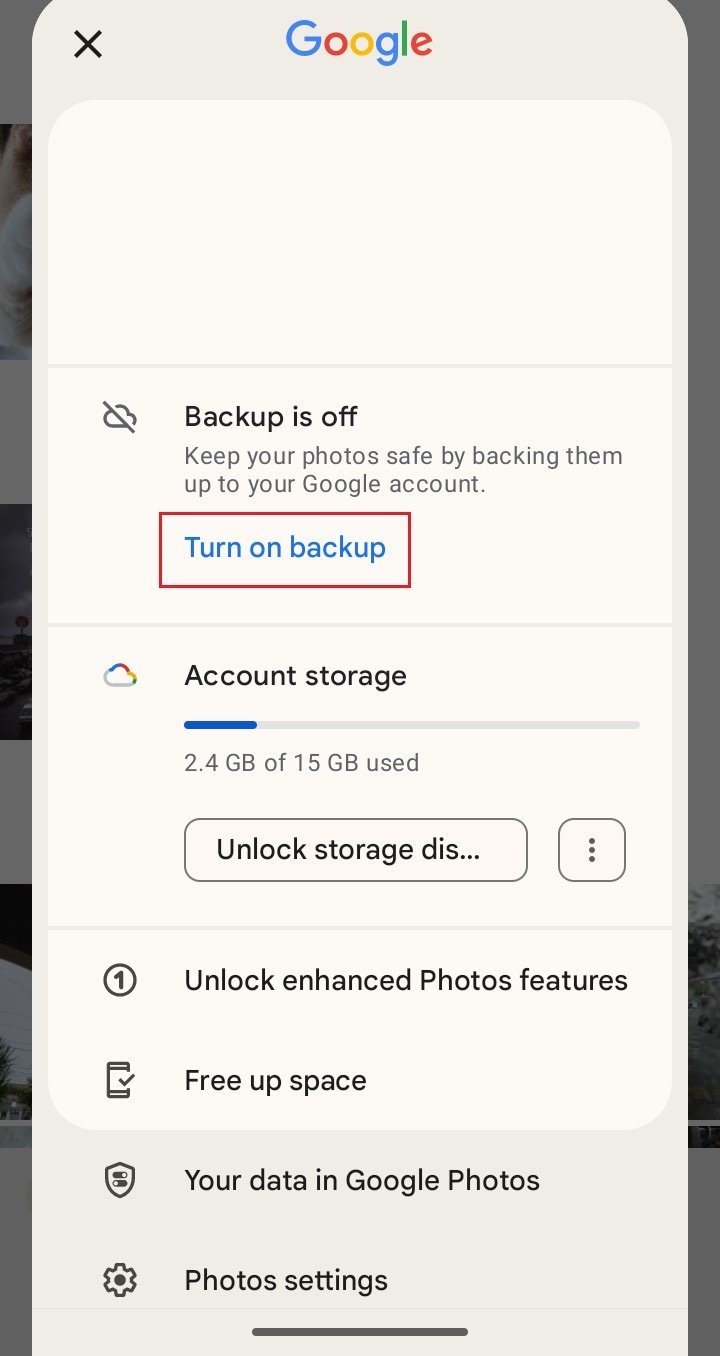
- Step 2: Launch the Browser on your computer. Go to google.com.
- Step 3: Click the Nine-dotted menu icon next to your profile. Make sure that you’re logged in to the same Gmail account you’re currently using on your smartphone.
- Step 4: Choose Photos.

- Step 5: Click the images you want to save on your computer. From there, click the Three-dotted menu icon. Find and click Download or press SHIFT + D on your keyboard.
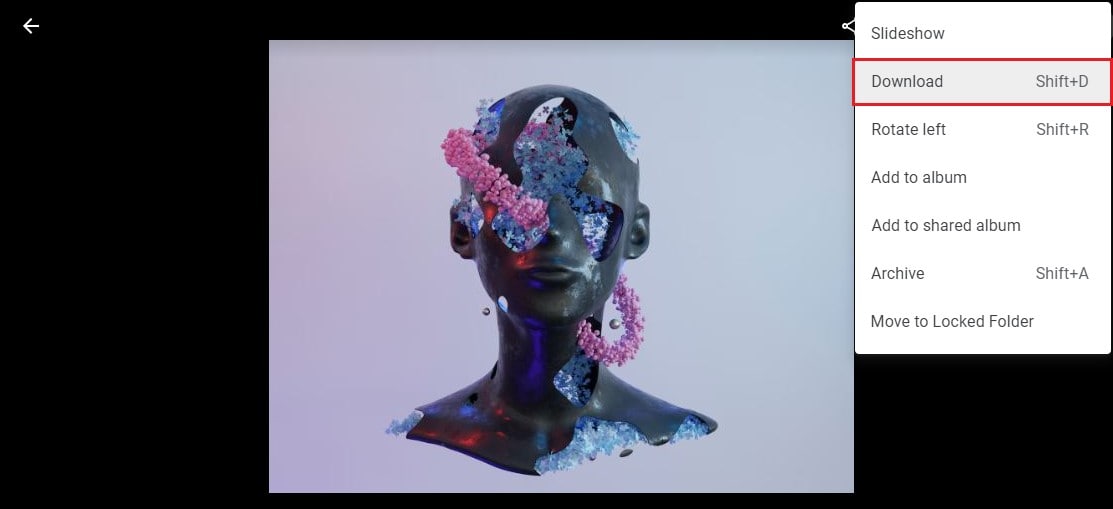
NOTE: How to transfer videos from your phone to your laptop without USB? This data migration technique also works in this regard.
Method 3: Transfer photos from phone to laptop using Bluetooth
Does your laptop have a Bluetooth connectivity feature? If so, try to use it for the photo transfer. Just connect your smartphone to the computer via Bluetooth and go ahead with the migration. Here’s a short guide on how to transfer photos from your phone to your laptop without USB via Bluetooth.
- Step 1: Turn on the Bluetooth connection on your smartphone and your computer.
- Step 2: On your smartphone, select the photos you want to transfer. Click on it.
- Step 3: Click Share.
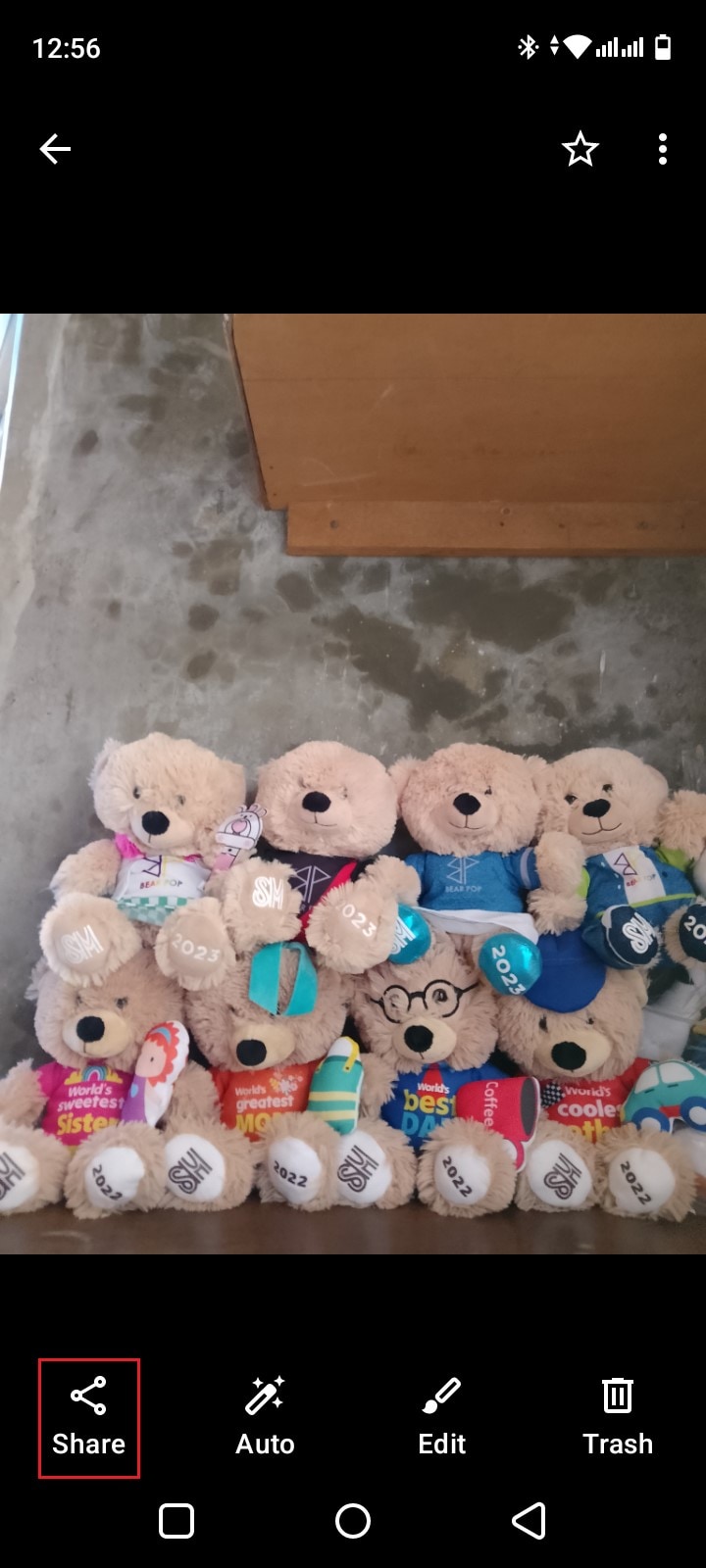
- Step 4: Click Bluetooth. Select your computer from the list. Then, click on it. Wait for the transfer to be completed in a few seconds.
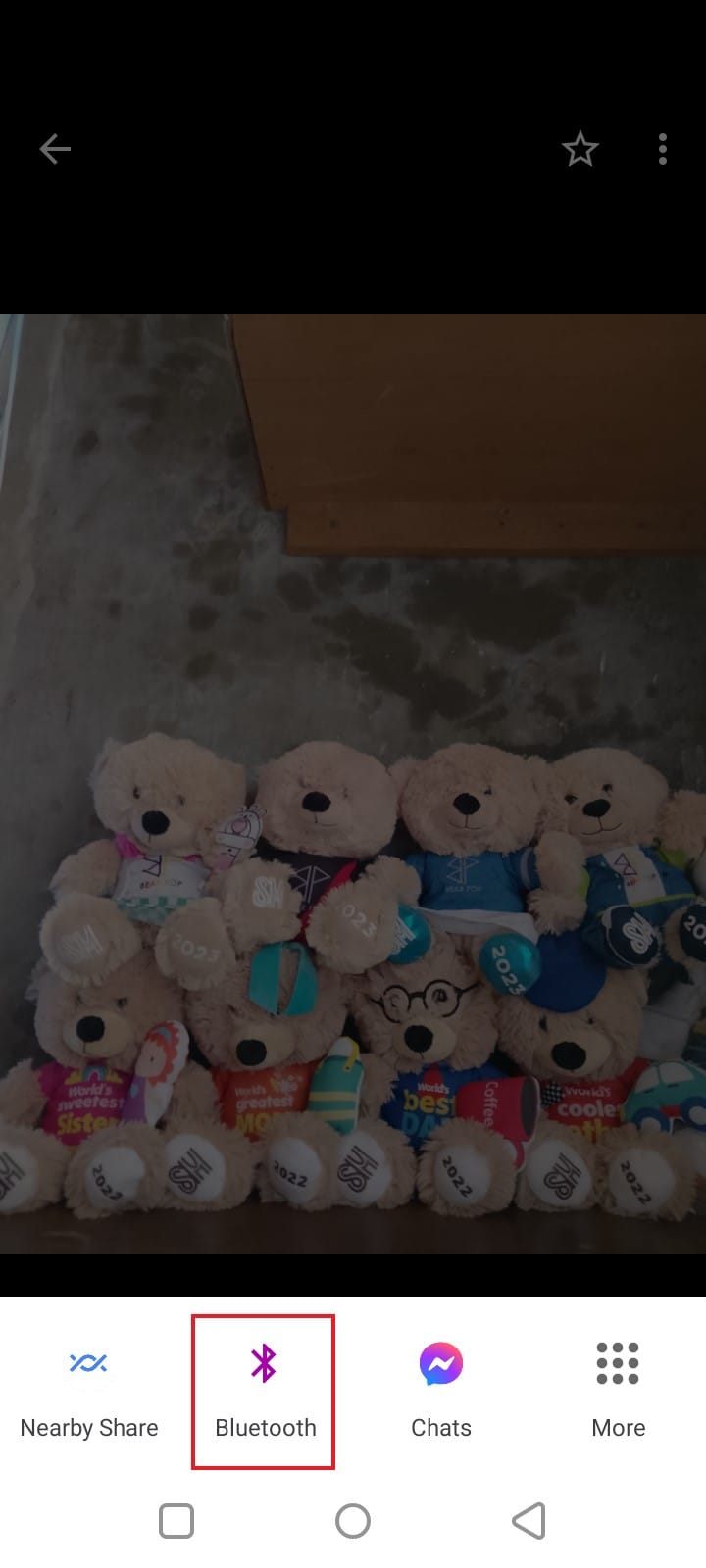
Method 4: Email the photos from the phone to the laptop
If you’re only sending a few photos to your laptop, emailing them from your smartphone will certainly work great. Here’s how to transfer photos from your phone to your laptop without USB via email.
- Step 1: Launch the Gmail application on your smartphone. From there, click Compose.
- Step 2: Key in the recipient’s email address to the To field. Make sure that it is currently logged in to the browser on your computer.
- Step 3: Click the Attachment icon on the top-right corner of your screen. After that, choose the photos you want to transfer.
- Step 4: Click the Send button.
- Step 5: On your computer, launch the browser and sign in to the Gmail account delegated as the receiver of the transfer.
- Step 6: Find and click the Email to view them. From there, hover the mouse cursor over the photo attachment you want to download. Lastly, click the Download icon.
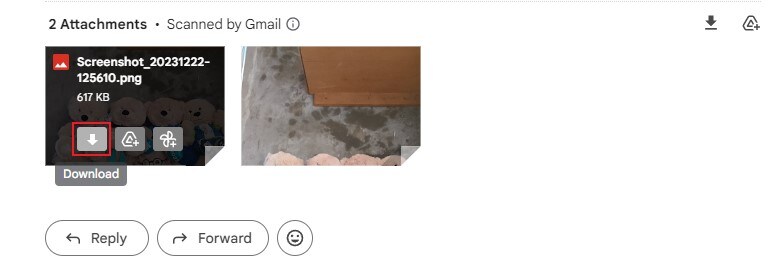
NOTE: How to copy files from your phone to your laptop without USB? This data migration technique also works in this regard.
Method 5: Transfer photos from phone to laptop using AirDrop
Are you using an iPhone and a Macbook? No problem. You may use AirDrop to move your photos between these two devices. Here’s a short guide on how to transfer photos from your phone to your computer without USB via AirDrop.
- Step 1: Activate AirDrop on your iPhone and Macbook.
- Step 2: On your iPhone, go to the Photos application.
- Step 3: Choose the media files you want to transfer. After that, click the Share icon at the bottom-left corner of your screen.
- Step 4: Choose AirDrop.
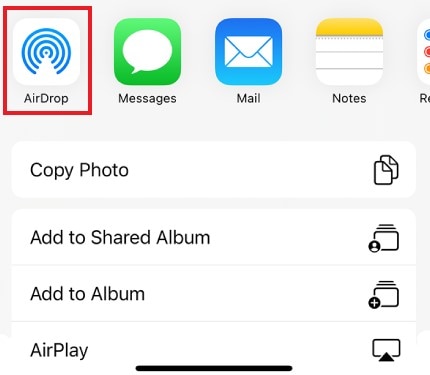
- Step 5: Select your Macbook as the recipient.
- Step 6: On your Macbook, click Accept.
BONUS TIP: How to Copy Files From One Smartphone to Another?
As a bonus, it is important to know that transferring files from one device to another in a secure environment is significant. It safely copies the documents and lowers the risk of data loss and corruption.
With the holidays fast approaching and the abundance of noteworthy photos, videos, and moments coming your way, having a steadfast solution is crucial. This is where Wondershare brings a compact yet efficient tool to help you. Wondershare Dr.Fone lets you quickly transfer photos and files to another mobile device in no time. To back this up, here is a quick, comprehensive guide on how to do it in a few simple steps.
Suppose you’re upgrading to an IOS device and need a quick way to transfer files from your old Android device. Then here’s your go-to guide using Wondershare Dr.Fone.
- Step 1: Open Wondershare Dr.Fone on your computer and navigate to the Toolbox section. Select the Phone Transfer tool.

- Step 2: Once opened, set the Source and Destination devices for the data transfer. Use the Flip button to change the transfer direction between the Infinix Note 30 VIP devices.
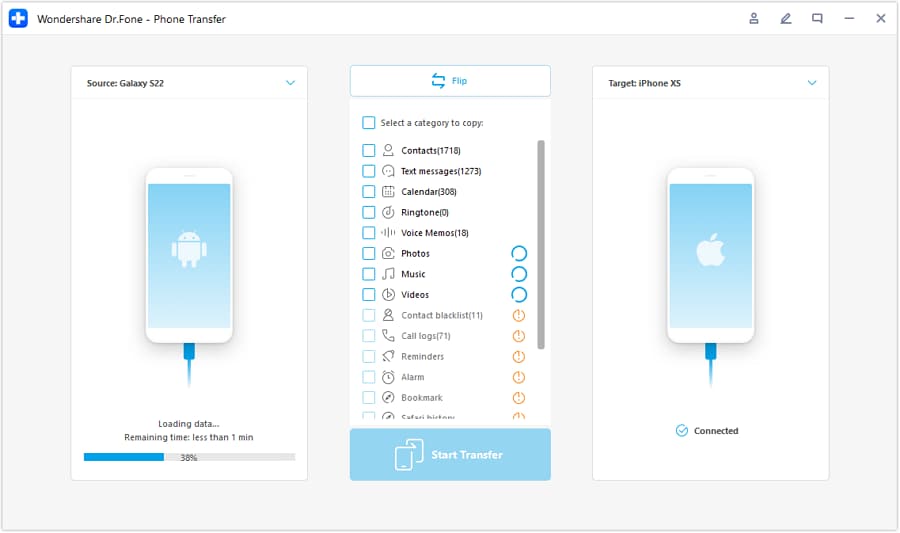
- Step 3: Set the transfer direction from Infinix Note 30 VIP to iOS. Select the specific data types you want to transfer. Checkmark the desired items and click Start Transfer.
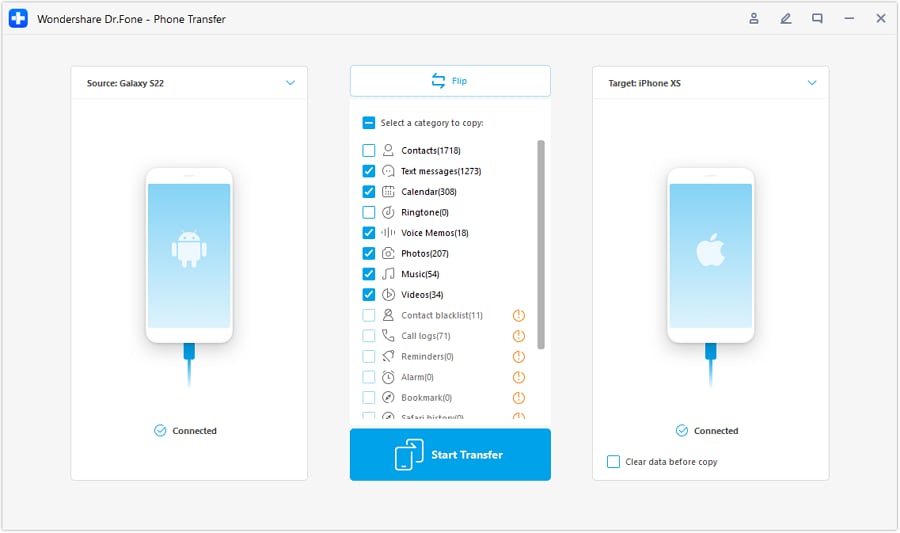
- Step 4: A new window will show the progress of the transfer. If you want to stop the operation, click Cancel.

- Step 5: Once completed, click OK to close the window.
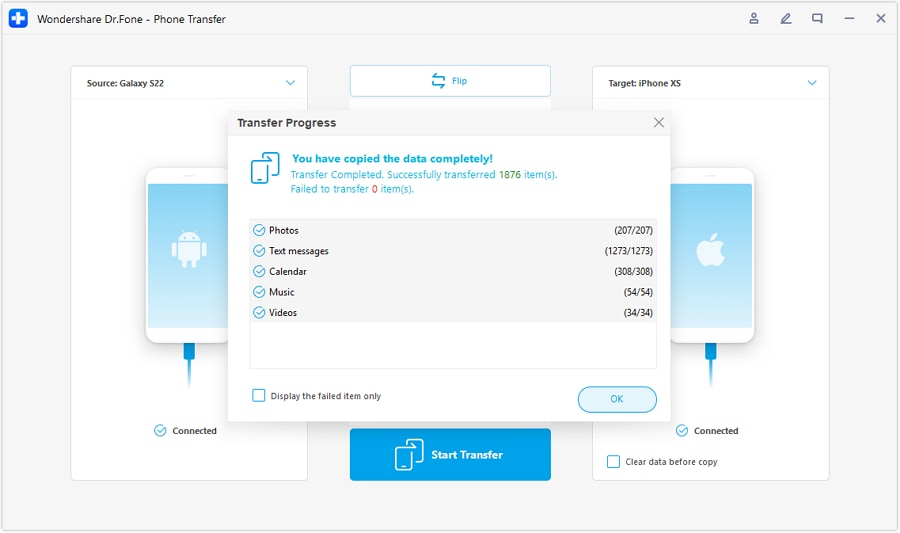
Conclusion
Navigating the digital landscape of photo organization and transfer has become increasingly vital in our fast-paced era. This article showcased various wireless methods, from iCloud to Bluetooth, and offered a step-by-step guide on how to transfer photos from phone to laptop without USB cables. As a valuable bonus, Wondershare Dr.Fone emerges as a trustworthy solution for efficiently transferring photos and files between mobile devices, ensuring a hassle-free experience. As we approach the holiday season, where memories are plentiful, having a reliable tool like Wondershare Dr.Fone can enhance the management of our digital archives, making it easier to cherish and share moments with friends and family.
How to Transfer Data After Switching From Infinix Note 30 VIP to Latest Samsung
Have you finally gotten your hands on the latest smartphone from Samsung’s flagship Galaxy S series? Whether you have the compact S23, the slightly larger S23 Plus, or the sleek S23 Ultra, you’re in for a thrilling ride of exceptional performance and vivid graphics.
What about files on your old Android? Can you transfer data after switching from Infinix Note 30 VIP to Samsung S23? Sure thing. We’ll walk you through the seven best methods for Android to Samsung data transfer shortly.
However, can you save all the data? Let’s find out.
Can You Save Your Data After Switching From Infinix Note 30 VIP to Samsung S23?
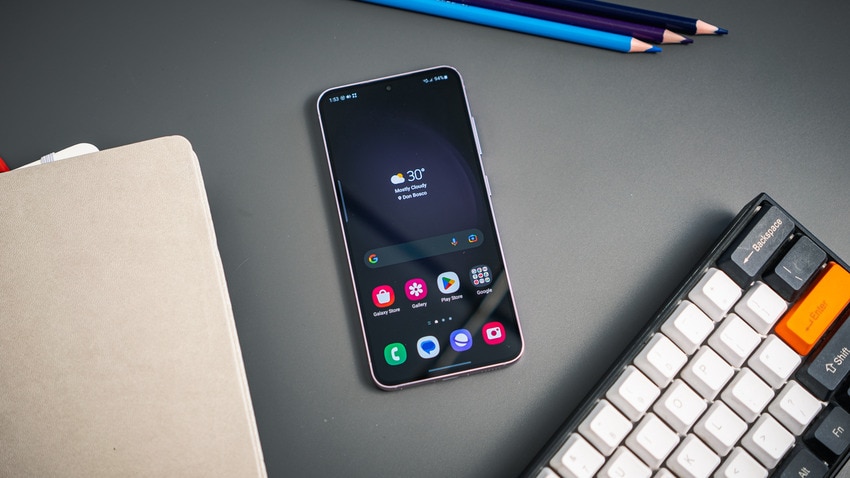
You can save all data after switching from Infinix Note 30 VIP to Samsung S23. It doesn’t matter which Android phone you’ve used before buying the latest Samsung model because you have many data transfer options.
Samsung Smart Switch may have features exclusive to Galaxy devices (among other limitations), but all methods let you transfer data seamlessly from Infinix Note 30 VIP to Samsung S23. Here’s how each works.
The following methods will help you move data from Infinix Note 30 VIP to Samsung S23 within minutes. Each is straightforward, so your choice will depend on your preferences. Let’s dive in.
1. Transfer Data Using Wondershare Dr.Fone Phone Transfer
Wondershare Dr.Fone is an all-in-one phone manager offering multiple tools. Besides moving data between phones, it lets you repair your Android system, recover files and passwords, remove lock screens, and erase data. You can even transfer WhatsApp, Viber, WeChat, and LINE chats and files.
Here’s how to move data from Infinix Note 30 VIP to Samsung S23 with Wondershare Dr.Fone:
- Download and install the app on your computer.
- Go to Toolbox > Phone Transfer.

- Connect your old Android and Samsung S23 to the computer with USB cables.
- Set the source and destination devices in Wondershare Dr.Fone Phone Transfer. The app will load data automatically.
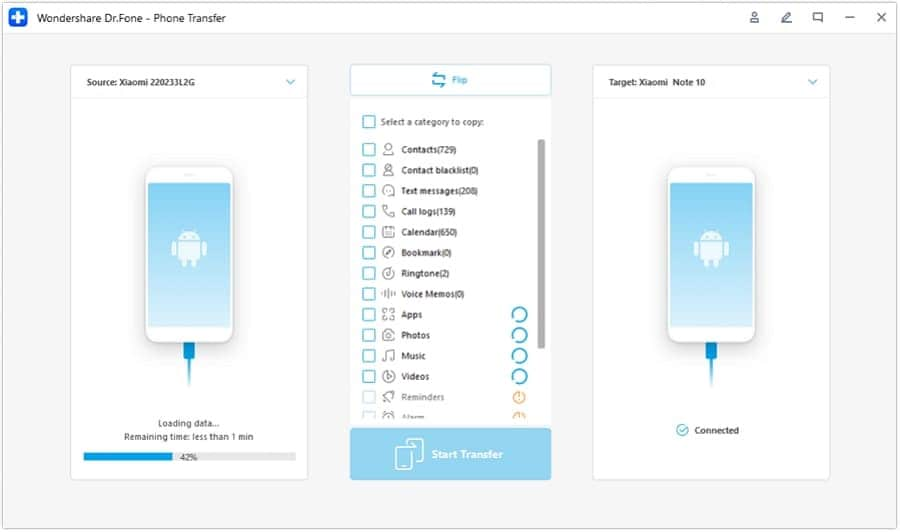
- Select the categories to copy to Samsung S23 and click Start Transfer.
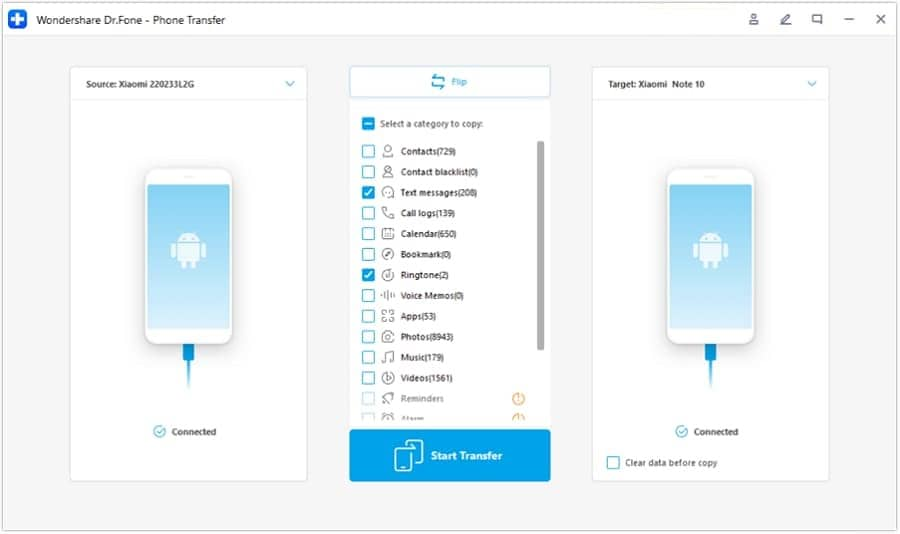
Wondershare Dr.Fone Phone Transfer lets you move apps, contacts, photos, videos, music, ringtones, text messages, voice memos, call logs, bookmarks, and calendar data between Android devices.
2. Move Data From Infinix Note 30 VIP to Samsung Using Smart Switch
Samsung’s Smart Switch app is excellent for moving data (even settings) between Android devices. However, you can only transfer settings, memos (including voice), and app data between Galaxy phones.
Also, you can’t transfer apps you haven’t downloaded from the Play Store or encrypted data like WhatsApp chats. Wondershare Dr.Fone is better if you don’t want to lose your IM conversations.
Here’s how to move data from Infinix Note 30 VIP to Samsung S23 with Smart Switch:
- Download and install Smart Switch on both phones and place them next to one another.
- Get your Samsung S23 and go to Settings > Accounts and backup > Bring data from an old device.
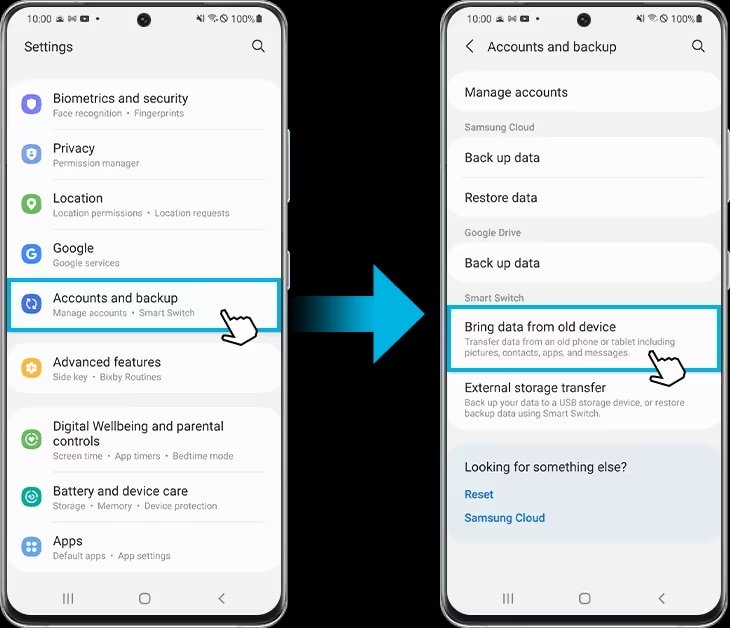
- On your Samsung S23, tap Receive dataand choose Galaxy/Android as the source.
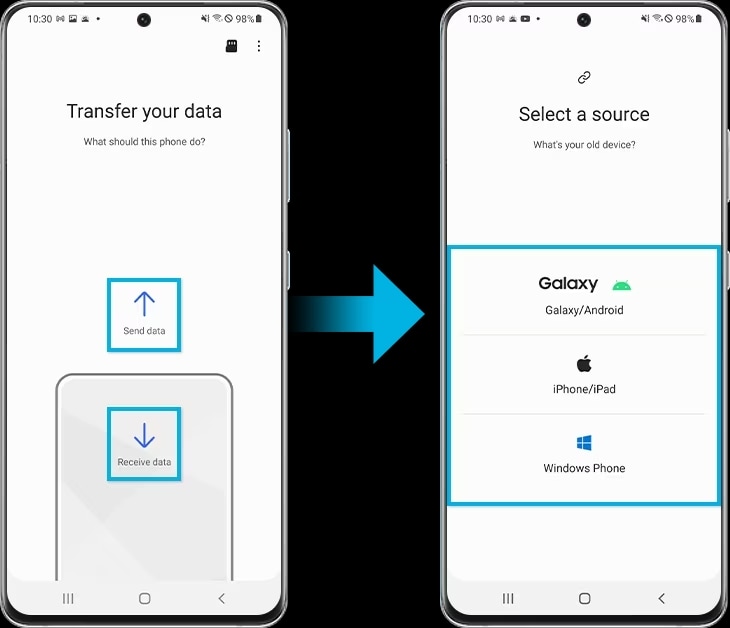
- Tap Send dataon your old phone and select Wireless (it’s faster than a cable connection). Tap Allow to enable data access.
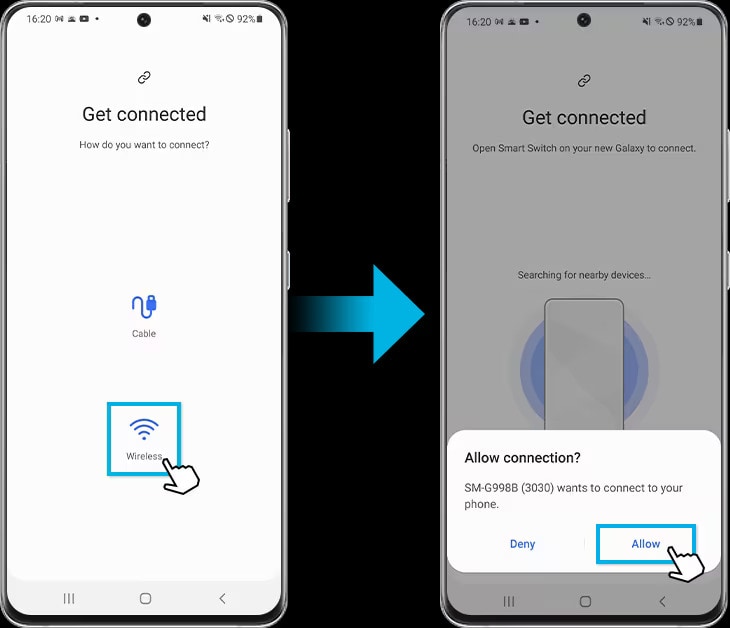
- Choose the desired data using your Samsung S23, tap Transfer, then Go to the Home screenonce everything is on your new phone.
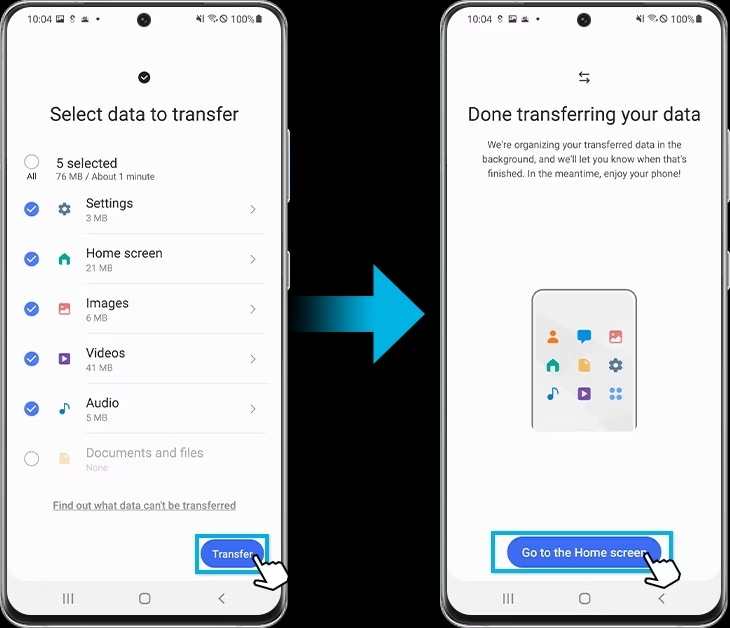
Remember to charge both phones before transferring data or connect them to a power source to ensure the process goes smoothly.
3. Transfer Data Using Google Account Sync
Backing up your Google Account data with Google One means accessing it on any device upon login. The backup includes apps, phone settings, messages, calls, photos, videos, and your chosen Google Account data (e.g., contacts, calendar, emails, and documents).
Here’s how to transfer data to Samsung Galaxy S23 using Google Account synchronization:
- Go to Settings > Google > Backup > Google Account dataon your old Android phone and toggle on the desired switches for synchronization.
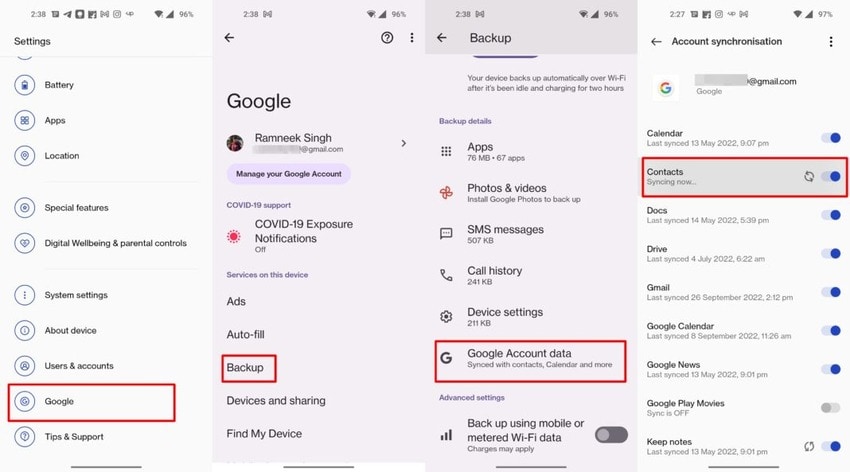
- On your Samsung S23, go to Settings > Googleand log into your backed-up Google Account.
Everything you’ve previously backed up will automatically sync once you log into your Google Account.
4. Share Data via Bluetooth
Bluetooth may be slower than most data-sharing methods, but its reliability is why we never have to imagine life without it. It may not support transferring settings or downloaded apps, but it’s excellent for moving all your photos, videos, music, and other files.
Here’s how to share data between Android and Samsung S23 via Bluetooth:
- Go to Settings > Connectionsand toggle on the Bluetooth switch on both phones. Alternatively, use a shortcut in the Notification panel.
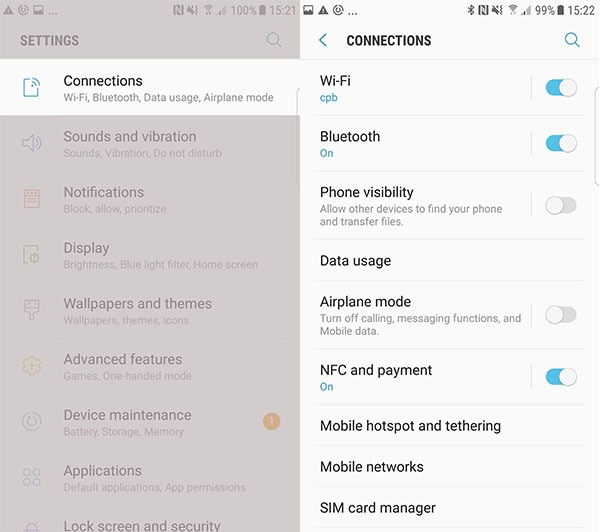
- Pair the phones and select folders or files you wish to transfer to your Samsung Galaxy S23.
- Tap Share > Bluetoothand choose your new phone.
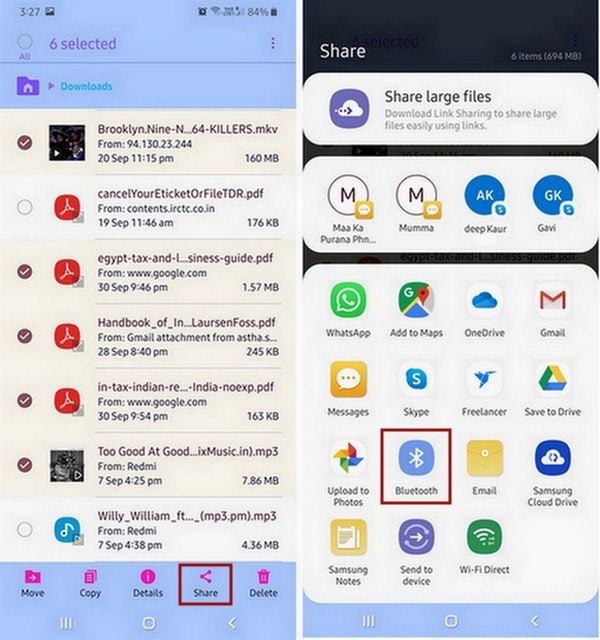
Sharing data via Bluetooth may take a while, but this valuable feature will bring everything you need to your new smartphone.
5. Use Google Drive
Google Drive is a prominent cloud storage and file-sharing platform. You’re missing out if you don’t use it. It lets you synchronize data across devices, access files in the cloud, and create presentation slides, spreadsheets, forms, and documents (online and offline).
Transferring data from Infinix Note 30 VIP to Samsung S23 is seamless with Google Drive. Here’s what to do:
- Launch Google Drive on your old Android and tap New > Upload. The Newbutton features only a plus sign on some devices.
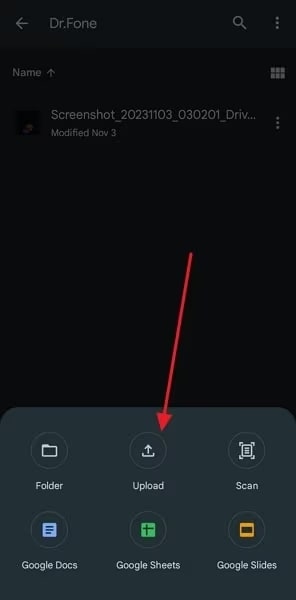
- Add all folders or files you wish to transfer to your new phone.
- Open Google Drive on your Samsung S23 and sign into the correct account.
- Select the uploaded data, tap the kebab menu(the three vertical dots in the top right corner), and hit Download.
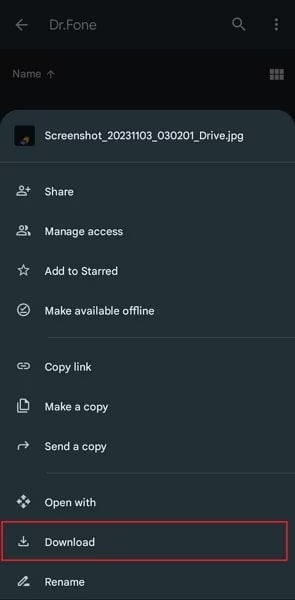
Google Drive may limit you to 15 GB of free storage, but it’s among the best Google apps for sharing files across devices. You may already use its desktop version to collaborate on docs and spreadsheets, so why not leverage its handy mobile app?
6. Transfer Data Using a USB Cable
USB cables—the unsung heroes of connectivity. Like Bluetooth and Wi-Fi, we can’t imagine life without them. They’re perfect for transferring data between devices.
However, in this instance, we don’t mean the traditional data transfer between your phone and computer (we’ll get to that shortly). This trick involves connecting your old Android phone to your new Samsung Galaxy S23 with a USB cable.
It’s almost like Samsung’s Smart Switch, except you don’t need to download an app and can move more data. You can transfer everything from your old Android device’s internal storage to your new smartphone. Here’s how:
- Connect your phones using a USB-C to USB-C cable. Your Samsung Galaxy S23 came with it.
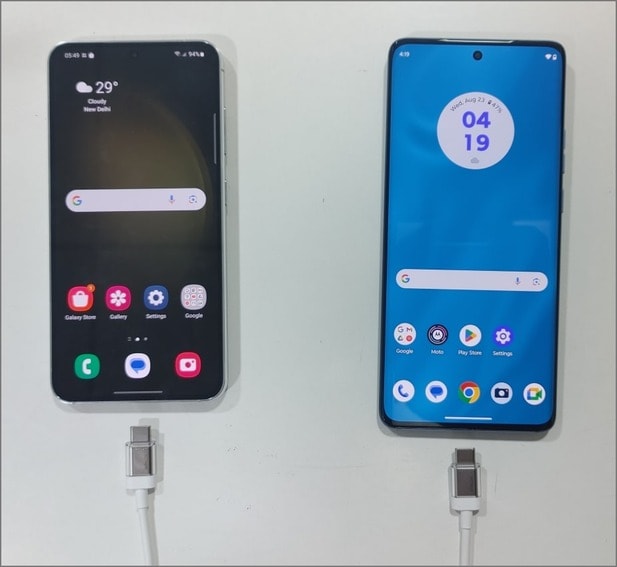
- Tap Connected to Androidon your Galaxy S23 phone and select MTP Host (Media Transfer Protocol).
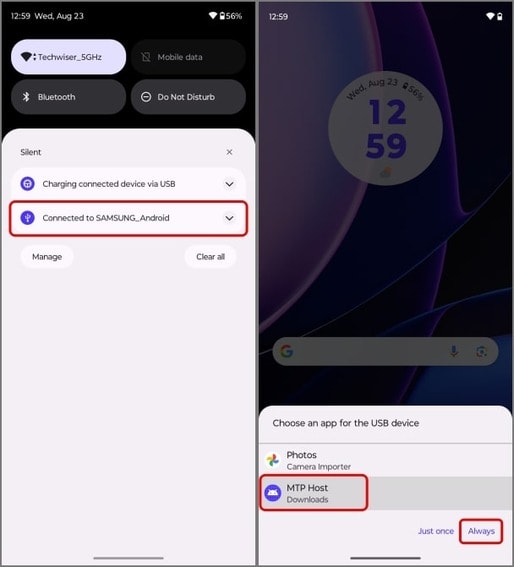
- Tap Allowon your old Android to enable data access.
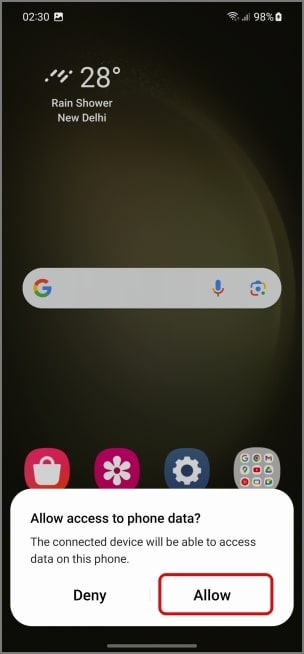
- Choose the desired file manager on your new phone and browse your old Android’s internal storage.
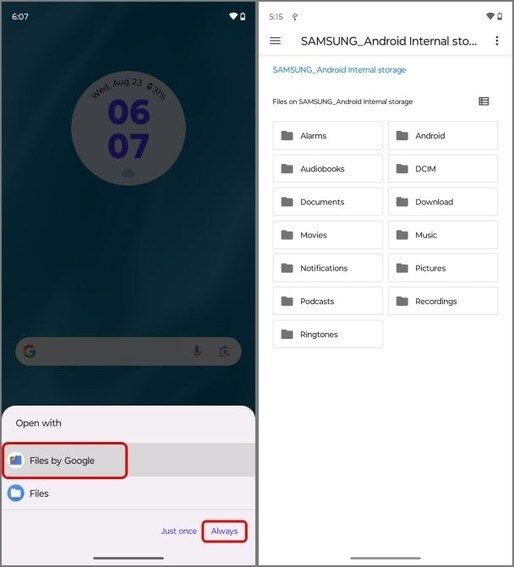
- Choose folders or files to transfer, tap the kebab menufor more options, and select Copy to.
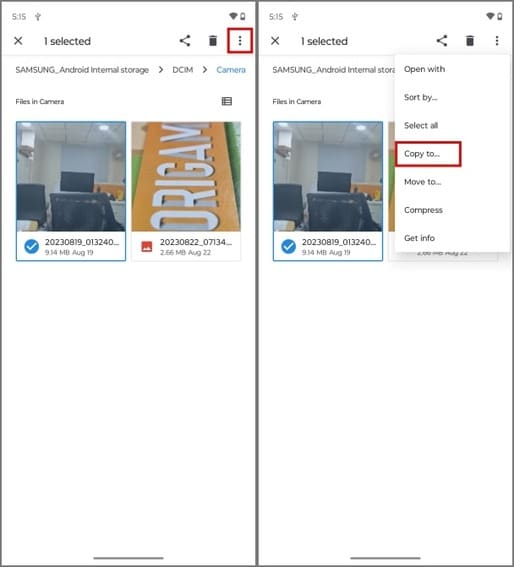
- Pick any location on your Samsung S23 phone (e.g., the Downloadsfolder for quick access) and tap Copy.
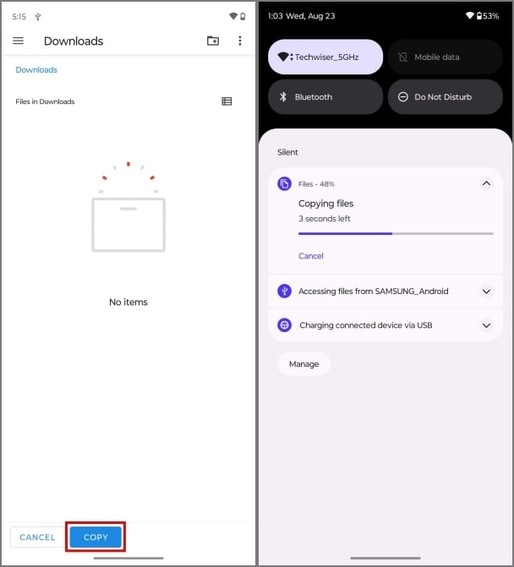
Moving data between phones using a USB cable is faster than Bluetooth but offers the same functionality. However, charge your devices beforehand because the data transfer may take a while (if you have many sizable files).
7. Use an SD Card
We can almost see you fumbling with your Samsung S23, looking for an SD or microSD card slot. Newsflash: there isn’t one. Like its predecessors, S21 and S22, the Galaxy S23 series doesn’t support expandable storage.
How can you transfer data from an SD card, then? Well, there’s always your computer. You can migrate your SD card data to your desktop or laptop before moving it to your new Galaxy phone.
It may not be as straightforward as the methods above, but it’s ideal for keeping precious files from your old Android’s SD card. Here’s what to do:
- Select the desired files or folders on your old Android, tap Move, and choose your SD card.
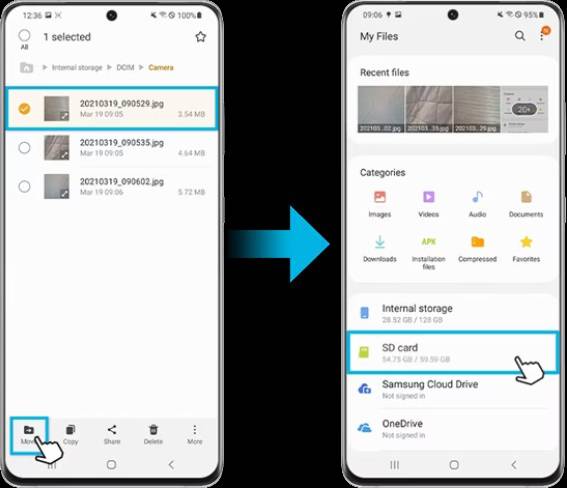
- Connect the Android to your computer with a USB cable.
- Tap USB for file transferin the Notification panel and select Transferring files / Android Auto.
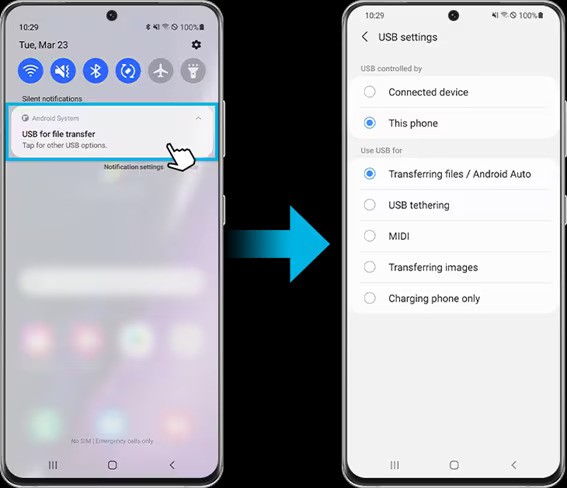
- Go to This PCin File Explorer and open your phone under Devices and drives.
- Right-click the folders or files you wish to move, select Copy, and paste them to any location on your computer.
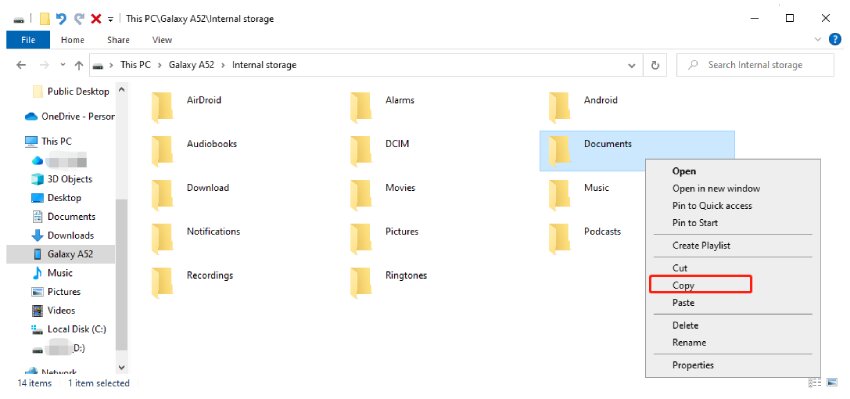
- Once you move the data, safely disconnect your old Android and connect your Samsung S23 to the PC.
- Go to the folder with your newly saved data and copy-paste it to your Samsung S23.
This method is best for transferring photos, videos, and other files from an SD card you might not use anymore. After all, smartphone manufacturers increasingly ditch SD card slots for sleek, more compact designs.
Conclusion
Switching from Infinix Note 30 VIP to Samsung S23 is a breeze because you have many data transfer options. Besides Samsung’s Smart Switch, you can use your synced Google Account, Google Drive, Bluetooth, or a USB-C to USB-C cable. You can also migrate data from your old Android SD card to your computer before transferring it to your new phone.
However, Wondershare Dr.Fone Phone Transfer might be your best option. Besides transferring files, it features many tools for seamless phone management, making it a fantastic addition to your digital toolbox.
How to Use Phone Clone to Migrate Your Infinix Note 30 VIP Data?
Dr.Fone - Phone Transfer
Best Tool to Migrate Huawei Phone Data
- Transfers any data between devices.
- Supports all phone models like iPhone, Samsung, Huawei, LG, Moto, etc.
- 2-3x faster transfer process compared to other transfer tools.
- Data kept absolutely secure during the transfer.
The rapid change in the mobile models has made it difficult for us to keep up with the trend. For some, while it might be a matter of owing only the best mobile, for others it’s a matter of enjoying the best of the world at each point of time. Thereby they try to keep up with the mobile trend by getting their hands on the latest mobile whenever possible whether iOS or Android. In such a scenario it becomes difficult to transfer data from one to another. But here is some mobile technology such as Phone Clone that will change it forever. So, let us see how you can use it to your advantage to transfer your valuable information.
Before we move on to see how to transfer data we will first see why someone would like to migrate the information from old phone to new phone:
- - To replace the old phone with a new phone as the primary phone
- - To back up all the info in both the phone
Moving on, in the subsequent section, we will understand how to use Phone Clone Infinix.
Part 1: How to use Phone Clone for Android?
Android has been ruling the world with its open-source technology and compatibility for a wide range of devices. As a result of which, many companies are producing the latest technology in hardware without any worry of OS support. Android phone makers such as Huawei, Samsung, HTC, and many others are at the trend of releasing flagship models at the different budget range on a regular interval. As a result, this has made people run like fans for grabbing a hand on the latest rig, to enjoy the best of the world at every point in time. In such a scenario, it becomes difficult to transfer your data from one phone to another securely. Well in this part, we will be introduced to the Huawei Phone Clone app that will help you to migrate information from one phone to another.
Here are the steps to be followed for Phone Clone Infinix to transfer your data from one phone to another:
1. First, install the app on both the phones, i.e., on both old and new mobiles
2. Open the app on the new phone. Click on the new phone button. A Wi-Fi will be created whose password will be displayed at the time of creation. You will need that password in the next step.
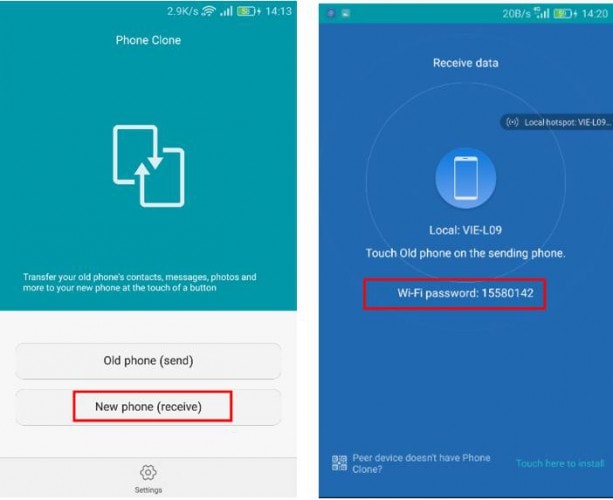
3. Open the app on the old phone. Click on the old phone button. Select the wi-fi network created in the 2nd step and enter the password that you received in the 2nd step.
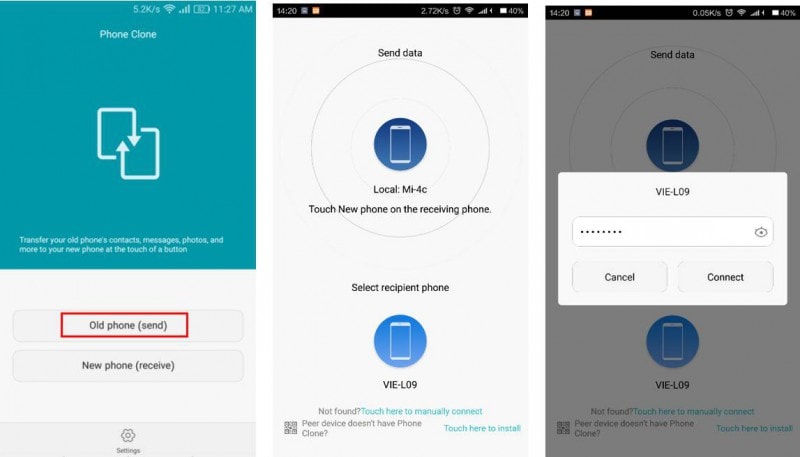
4. Once connected, click the number of tabs on the old phone that you want to send to a new phone.
Part 2: How to use Phone Clone for iPhone
The best part of the Huawei Phone Clone is that it supports not only Android but it also supports the iPhone. All the things that you can do while transferring data from one Android to another, you can achieve the same feat while transferring data from one iPhone to another iPhone. It is especially useful when you get that big update to your iPhone version, and most of the apps get useless due to the drastic hardware and software change in old and new iPhones. Thinking about changing your old iPhone to a new one could have been disastrous if not catastrophic if personal data could not have been transferable from one mobile to another. Phone Clone by Huawei lets you simply achieve the task while at the same time saving you a lot of data and time
Now, let us take a look at how you can use Phone Clone Infinix app without spending a penny on expensive services and with 4 simple steps:
1. Install the Phone Clone app on old and new iPhone mobile
2. Open the app for the new iPhone. Click on the send button. A Wi-Fi hotspot will be created, displaying its name and password.
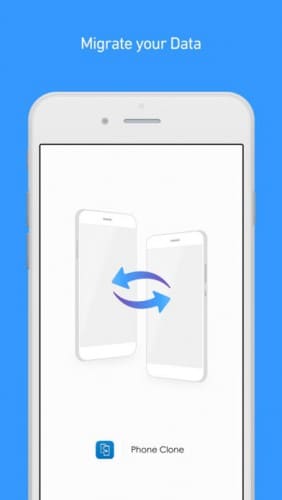
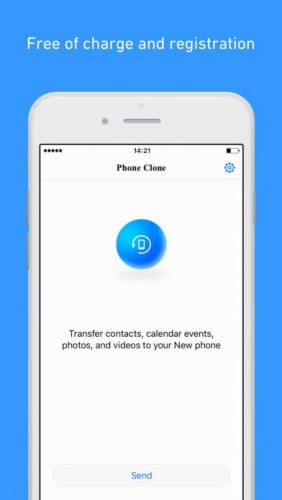
3. Go to the wi-fi setting of the old iPhone and connect to the Wifi network mentioned in step 2. Open the app on the old iPhone and click on next to complete the connection.
4. Once connected, click on the tabs presented in the old iPhone and select the tab that you want to send to the new iPhone.
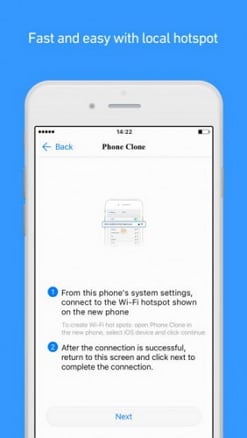
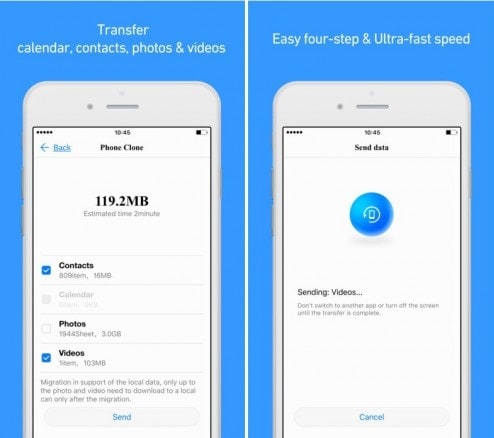
Part 3: Best Phone Clone alternative: Dr.Fone - Phone Transfer to migrate iPhone/Android data
While Phone Clone is free of cost and is a great emergency there is still much lagging in the app. It does not connect properly; it sometimes fails to send files completely and many more. To overcome we have with you the best Huawei Phone Clone alternative, called Dr.Fone - Phone Transfer , the easiest way to migrate iPhone/Android data.
Dr.Fone provides one of the best options to switch personal data from one phone to another seamlessly. It supports mobile of all kinds of data and service carriers, so you are not restricted to any particular type of mobile set or carrier service. Enjoy the freedom of information transfer without any loss in security and fast process.
Some of the pros of Dr.Fone - Phone Transfer are as follows:
Dr.Fone - Phone Transfer
1-Click Phone-to-Phone Transfer
- Easy, fast, and safe.
- Move data between devices with different operating systems, i.e. iOS to Android.
- Supports iOS devices that run the latest iOS version

- Transfer photos, text messages, contacts, notes, and many other file types.
- Supports over 8000+ Android devices. Works for all models of iPhone, iPad, and iPod.
3981454 people have downloaded it
Here is a small comparison of how data transfer from one platform to another platform fares in Dr.Fone
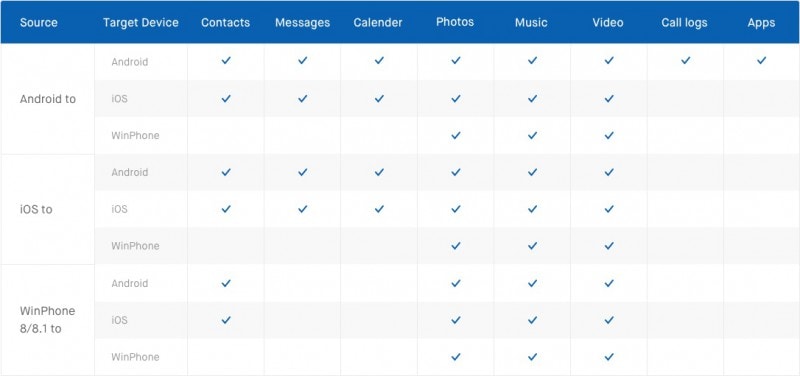
Now let us take a look at how to use Dr. Fone to transfer data between mobiles:
1. Launch the Dr.Fone app on the computer and select Phone Transfer.

2. Connect both the mobile to the computer and select the send and receive side on the computer
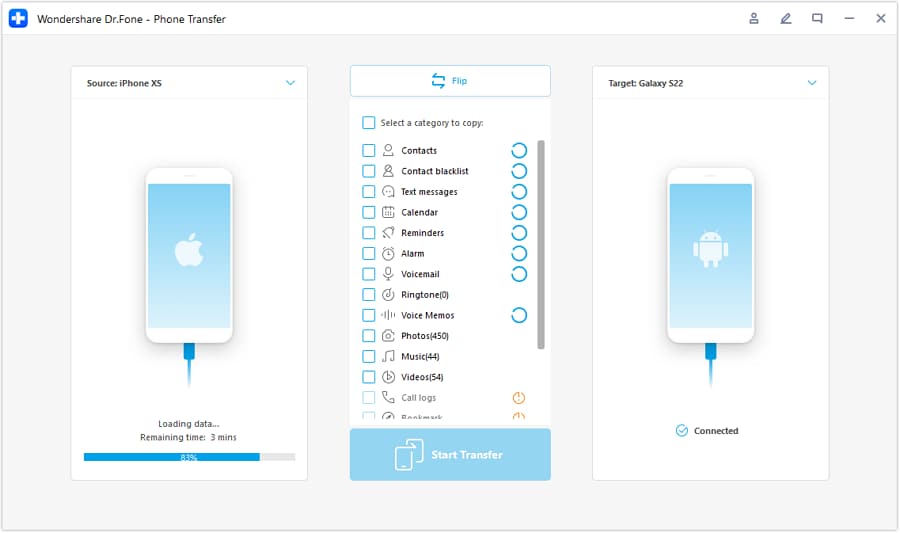
3. Select the files and then click on “Start transfer” to complete the transfer process
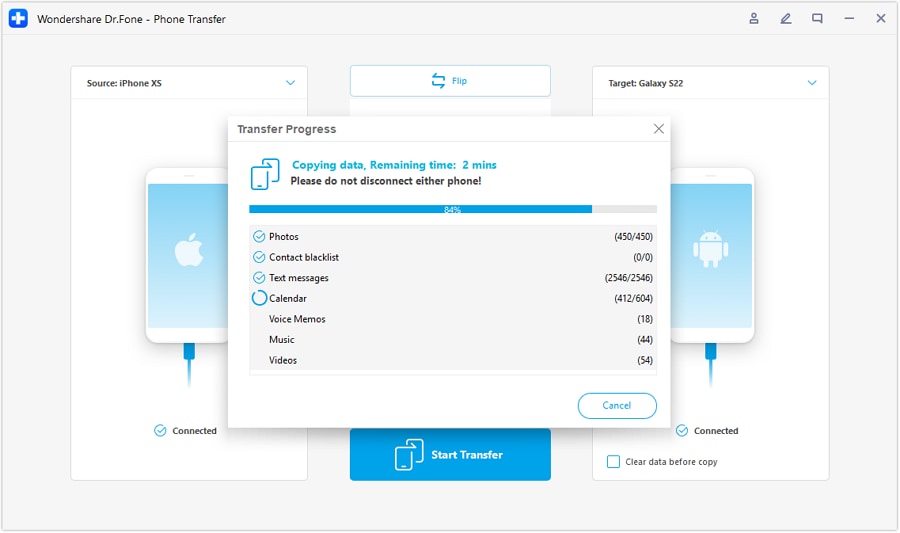
The best part of Dr.Fone is that you can try it free of cost to check if it suits your requirements. We are sure that its jaw-dropping feature will leave an impression on your mind.
We hope that you learned some of the phone clone methods and applications that you can use to transfer your information from an old phone to a new phone. Use the methods mentioned above and be sure that you are on the safer and faster side of transferring data.
Also read:
- [Updated] Holistic Locomotion Examination 2023 for 2024
- 2024 Approved Pro Audio Recordings The 11 Best Tools for Live Events
- Diagnosing Windows Black Screen Issues: Insights From YL Computing Experts
- How to Transfer Photos from Tecno Pova 6 Pro 5G to Laptop Without USB | Dr.fone
- How to Transfer Photos from Vivo V27e to Laptop Without USB | Dr.fone
- How to Transfer Photos From Vivo X100 Pro to Samsung Galaxy S21 Ultra | Dr.fone
- In 2024, 2 Ways to Transfer Text Messages from Motorola Moto G13 to iPhone 15/14/13/12/11/X/8/ | Dr.fone
- In 2024, Apple iPhone 15 Plus iCloud Activation Lock Bypass
- In 2024, How I Transferred Messages from Infinix Note 30i to iPhone 12/XS (Max) in Seconds | Dr.fone
- In 2024, How to Transfer Data from Lava Yuva 3 to Other Android Devices? | Dr.fone
- Overcoming Format Barriers: A Comprehensive Guide for Watching Unsupported Videos on TV Screens
- Simplifying Content Creation: How iOS 18 Upgrade Enhances iPhone 14 User Experience - Insights From ZDNet
- Ultimate guide to get the meltan box pokemon go For Vivo G2 | Dr.fone
- Why does the pokemon go battle league not available On Honor 90 | Dr.fone
- Title: In 2024, How to Transfer Photos from Infinix Note 30 VIP to Laptop Without USB | Dr.fone
- Author: Emma
- Created at : 2025-01-08 16:24:03
- Updated at : 2025-01-11 16:51:01
- Link: https://android-transfer.techidaily.com/in-2024-how-to-transfer-photos-from-infinix-note-30-vip-to-laptop-without-usb-drfone-by-drfone-transfer-from-android-transfer-from-android/
- License: This work is licensed under CC BY-NC-SA 4.0.

